HSC210 - Applying Sociological Theories in Modern Healthcare Settings
VerifiedAdded on 2023/06/04
|8
|3236
|137
Essay
AI Summary
This essay delves into the significance of sociological theories and concepts for healthcare professionals, emphasizing their role in understanding patient behaviors, social interactions, and institutional structures. It discusses key sociological ideas such as socialization, social order, and social stratification, illustrating how these concepts influence healthcare delivery and patient care. The essay contrasts functionalist and Marxist perspectives, highlighting their differing views on social order, inequality, and the role of healthcare within society. It also examines the hierarchical structure of the healthcare system and the importance of power dynamics within healthcare organizations. The essay concludes by underscoring the value of sociological theories in enhancing healthcare professionals' skills and knowledge, ultimately leading to improved patient outcomes. Desklib offers a wealth of similar resources for students seeking to deepen their understanding of sociological theories in healthcare.
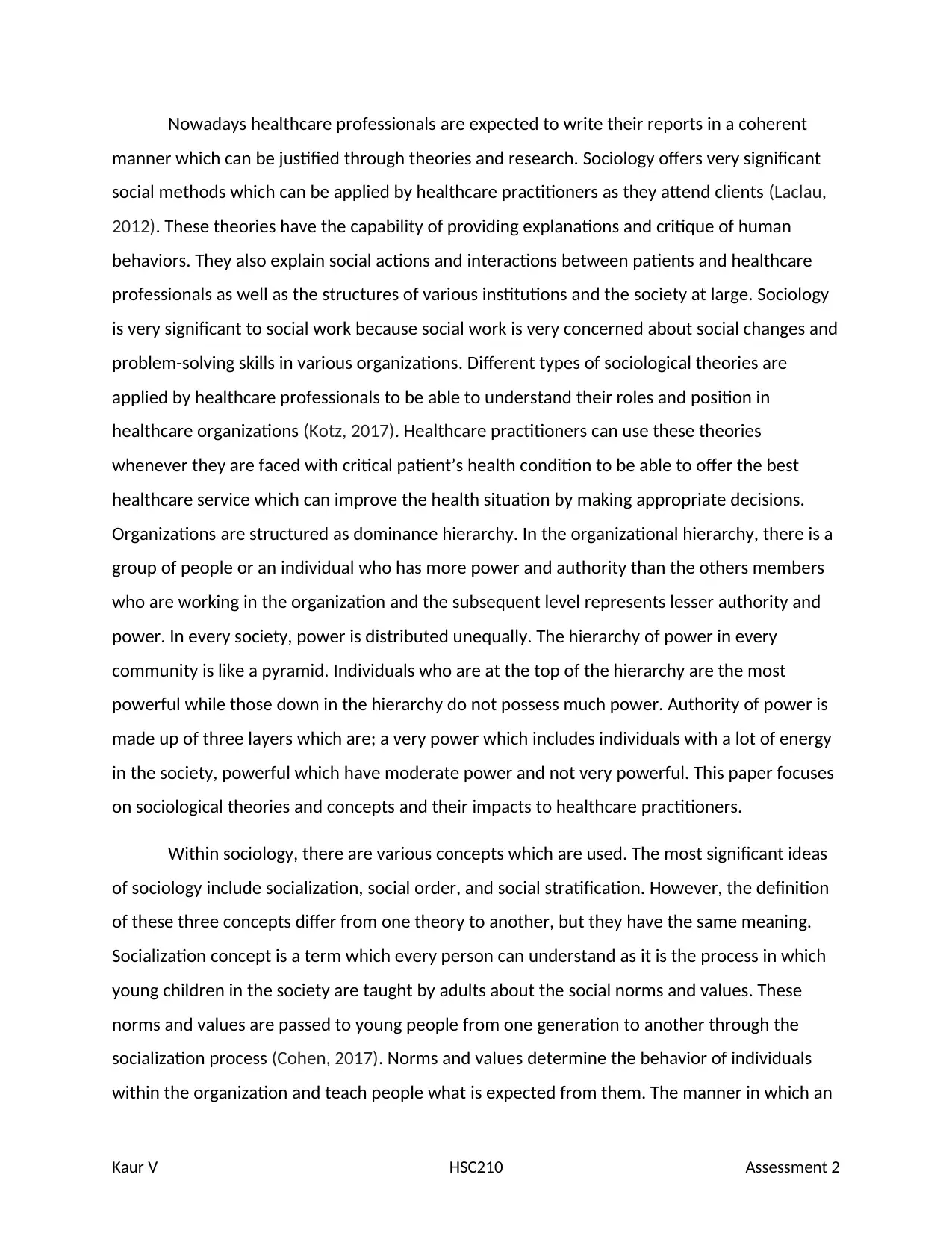
Nowadays healthcare professionals are expected to write their reports in a coherent
manner which can be justified through theories and research. Sociology offers very significant
social methods which can be applied by healthcare practitioners as they attend clients (Laclau,
2012). These theories have the capability of providing explanations and critique of human
behaviors. They also explain social actions and interactions between patients and healthcare
professionals as well as the structures of various institutions and the society at large. Sociology
is very significant to social work because social work is very concerned about social changes and
problem-solving skills in various organizations. Different types of sociological theories are
applied by healthcare professionals to be able to understand their roles and position in
healthcare organizations (Kotz, 2017). Healthcare practitioners can use these theories
whenever they are faced with critical patient’s health condition to be able to offer the best
healthcare service which can improve the health situation by making appropriate decisions.
Organizations are structured as dominance hierarchy. In the organizational hierarchy, there is a
group of people or an individual who has more power and authority than the others members
who are working in the organization and the subsequent level represents lesser authority and
power. In every society, power is distributed unequally. The hierarchy of power in every
community is like a pyramid. Individuals who are at the top of the hierarchy are the most
powerful while those down in the hierarchy do not possess much power. Authority of power is
made up of three layers which are; a very power which includes individuals with a lot of energy
in the society, powerful which have moderate power and not very powerful. This paper focuses
on sociological theories and concepts and their impacts to healthcare practitioners.
Within sociology, there are various concepts which are used. The most significant ideas
of sociology include socialization, social order, and social stratification. However, the definition
of these three concepts differ from one theory to another, but they have the same meaning.
Socialization concept is a term which every person can understand as it is the process in which
young children in the society are taught by adults about the social norms and values. These
norms and values are passed to young people from one generation to another through the
socialization process (Cohen, 2017). Norms and values determine the behavior of individuals
within the organization and teach people what is expected from them. The manner in which an
Kaur V HSC210 Assessment 2
manner which can be justified through theories and research. Sociology offers very significant
social methods which can be applied by healthcare practitioners as they attend clients (Laclau,
2012). These theories have the capability of providing explanations and critique of human
behaviors. They also explain social actions and interactions between patients and healthcare
professionals as well as the structures of various institutions and the society at large. Sociology
is very significant to social work because social work is very concerned about social changes and
problem-solving skills in various organizations. Different types of sociological theories are
applied by healthcare professionals to be able to understand their roles and position in
healthcare organizations (Kotz, 2017). Healthcare practitioners can use these theories
whenever they are faced with critical patient’s health condition to be able to offer the best
healthcare service which can improve the health situation by making appropriate decisions.
Organizations are structured as dominance hierarchy. In the organizational hierarchy, there is a
group of people or an individual who has more power and authority than the others members
who are working in the organization and the subsequent level represents lesser authority and
power. In every society, power is distributed unequally. The hierarchy of power in every
community is like a pyramid. Individuals who are at the top of the hierarchy are the most
powerful while those down in the hierarchy do not possess much power. Authority of power is
made up of three layers which are; a very power which includes individuals with a lot of energy
in the society, powerful which have moderate power and not very powerful. This paper focuses
on sociological theories and concepts and their impacts to healthcare practitioners.
Within sociology, there are various concepts which are used. The most significant ideas
of sociology include socialization, social order, and social stratification. However, the definition
of these three concepts differ from one theory to another, but they have the same meaning.
Socialization concept is a term which every person can understand as it is the process in which
young children in the society are taught by adults about the social norms and values. These
norms and values are passed to young people from one generation to another through the
socialization process (Cohen, 2017). Norms and values determine the behavior of individuals
within the organization and teach people what is expected from them. The manner in which an
Kaur V HSC210 Assessment 2
Paraphrase This Document
Need a fresh take? Get an instant paraphrase of this document with our AI Paraphraser
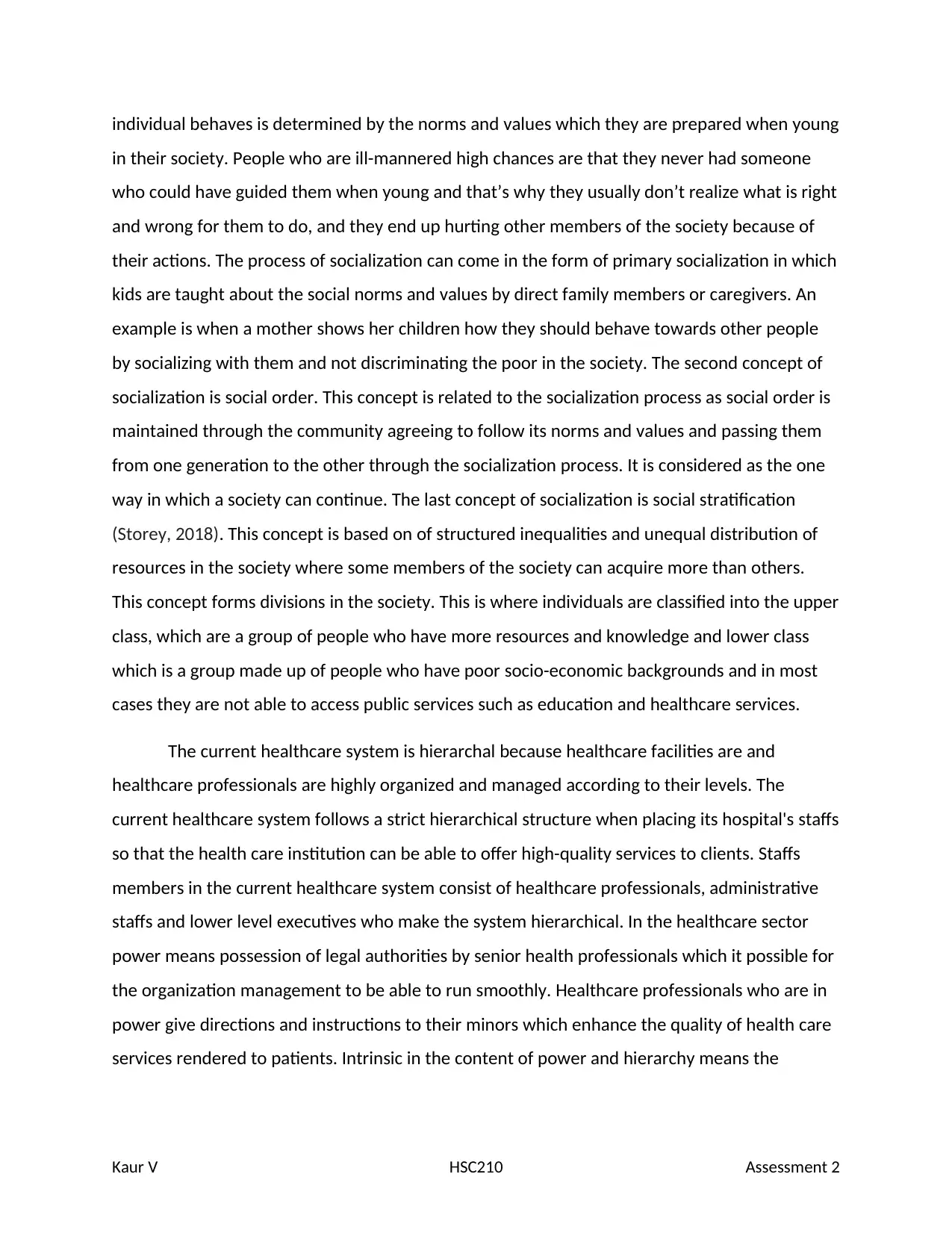
individual behaves is determined by the norms and values which they are prepared when young
in their society. People who are ill-mannered high chances are that they never had someone
who could have guided them when young and that’s why they usually don’t realize what is right
and wrong for them to do, and they end up hurting other members of the society because of
their actions. The process of socialization can come in the form of primary socialization in which
kids are taught about the social norms and values by direct family members or caregivers. An
example is when a mother shows her children how they should behave towards other people
by socializing with them and not discriminating the poor in the society. The second concept of
socialization is social order. This concept is related to the socialization process as social order is
maintained through the community agreeing to follow its norms and values and passing them
from one generation to the other through the socialization process. It is considered as the one
way in which a society can continue. The last concept of socialization is social stratification
(Storey, 2018). This concept is based on of structured inequalities and unequal distribution of
resources in the society where some members of the society can acquire more than others.
This concept forms divisions in the society. This is where individuals are classified into the upper
class, which are a group of people who have more resources and knowledge and lower class
which is a group made up of people who have poor socio-economic backgrounds and in most
cases they are not able to access public services such as education and healthcare services.
The current healthcare system is hierarchal because healthcare facilities are and
healthcare professionals are highly organized and managed according to their levels. The
current healthcare system follows a strict hierarchical structure when placing its hospital's staffs
so that the health care institution can be able to offer high-quality services to clients. Staffs
members in the current healthcare system consist of healthcare professionals, administrative
staffs and lower level executives who make the system hierarchical. In the healthcare sector
power means possession of legal authorities by senior health professionals which it possible for
the organization management to be able to run smoothly. Healthcare professionals who are in
power give directions and instructions to their minors which enhance the quality of health care
services rendered to patients. Intrinsic in the content of power and hierarchy means the
Kaur V HSC210 Assessment 2
in their society. People who are ill-mannered high chances are that they never had someone
who could have guided them when young and that’s why they usually don’t realize what is right
and wrong for them to do, and they end up hurting other members of the society because of
their actions. The process of socialization can come in the form of primary socialization in which
kids are taught about the social norms and values by direct family members or caregivers. An
example is when a mother shows her children how they should behave towards other people
by socializing with them and not discriminating the poor in the society. The second concept of
socialization is social order. This concept is related to the socialization process as social order is
maintained through the community agreeing to follow its norms and values and passing them
from one generation to the other through the socialization process. It is considered as the one
way in which a society can continue. The last concept of socialization is social stratification
(Storey, 2018). This concept is based on of structured inequalities and unequal distribution of
resources in the society where some members of the society can acquire more than others.
This concept forms divisions in the society. This is where individuals are classified into the upper
class, which are a group of people who have more resources and knowledge and lower class
which is a group made up of people who have poor socio-economic backgrounds and in most
cases they are not able to access public services such as education and healthcare services.
The current healthcare system is hierarchal because healthcare facilities are and
healthcare professionals are highly organized and managed according to their levels. The
current healthcare system follows a strict hierarchical structure when placing its hospital's staffs
so that the health care institution can be able to offer high-quality services to clients. Staffs
members in the current healthcare system consist of healthcare professionals, administrative
staffs and lower level executives who make the system hierarchical. In the healthcare sector
power means possession of legal authorities by senior health professionals which it possible for
the organization management to be able to run smoothly. Healthcare professionals who are in
power give directions and instructions to their minors which enhance the quality of health care
services rendered to patients. Intrinsic in the content of power and hierarchy means the
Kaur V HSC210 Assessment 2
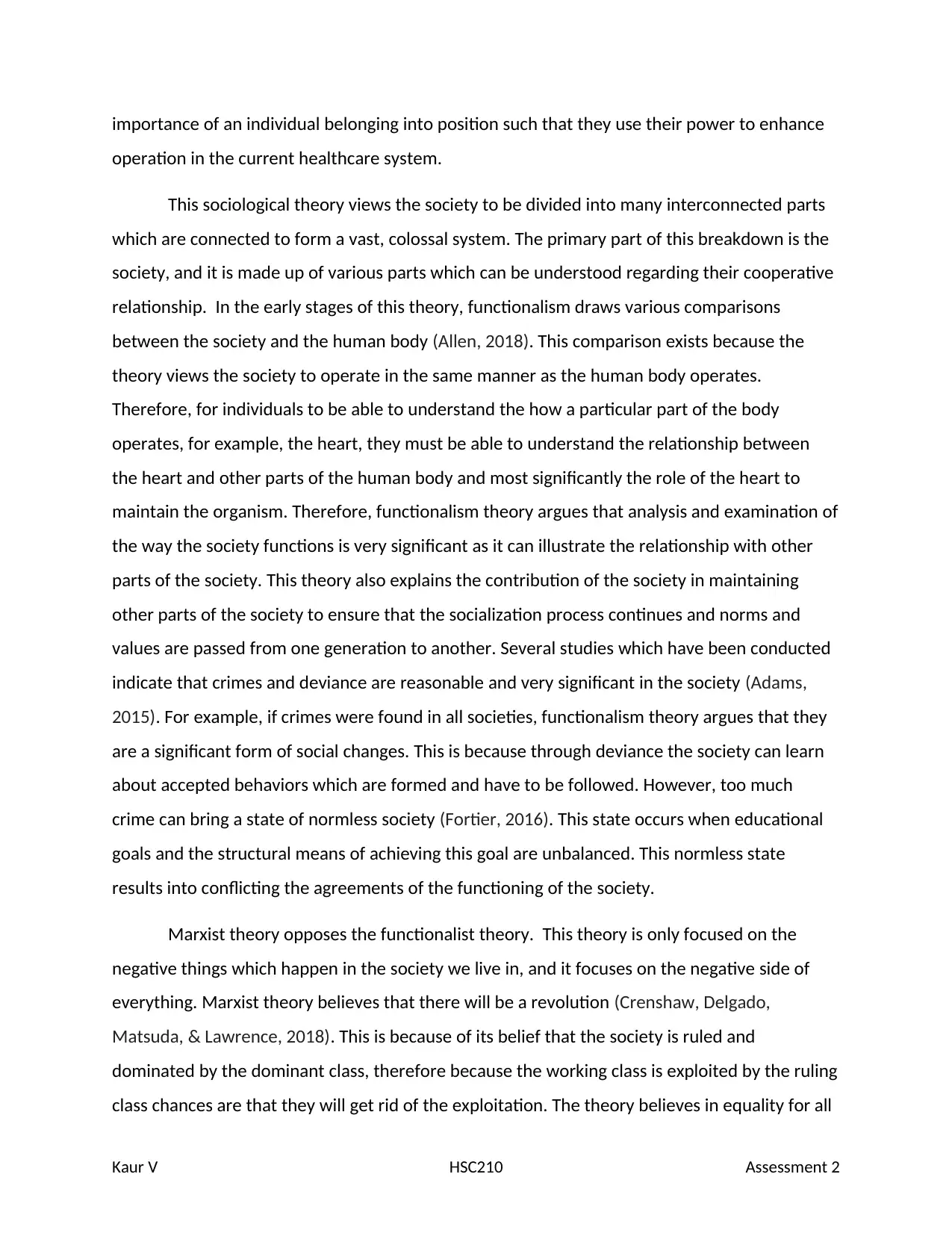
importance of an individual belonging into position such that they use their power to enhance
operation in the current healthcare system.
This sociological theory views the society to be divided into many interconnected parts
which are connected to form a vast, colossal system. The primary part of this breakdown is the
society, and it is made up of various parts which can be understood regarding their cooperative
relationship. In the early stages of this theory, functionalism draws various comparisons
between the society and the human body (Allen, 2018). This comparison exists because the
theory views the society to operate in the same manner as the human body operates.
Therefore, for individuals to be able to understand the how a particular part of the body
operates, for example, the heart, they must be able to understand the relationship between
the heart and other parts of the human body and most significantly the role of the heart to
maintain the organism. Therefore, functionalism theory argues that analysis and examination of
the way the society functions is very significant as it can illustrate the relationship with other
parts of the society. This theory also explains the contribution of the society in maintaining
other parts of the society to ensure that the socialization process continues and norms and
values are passed from one generation to another. Several studies which have been conducted
indicate that crimes and deviance are reasonable and very significant in the society (Adams,
2015). For example, if crimes were found in all societies, functionalism theory argues that they
are a significant form of social changes. This is because through deviance the society can learn
about accepted behaviors which are formed and have to be followed. However, too much
crime can bring a state of normless society (Fortier, 2016). This state occurs when educational
goals and the structural means of achieving this goal are unbalanced. This normless state
results into conflicting the agreements of the functioning of the society.
Marxist theory opposes the functionalist theory. This theory is only focused on the
negative things which happen in the society we live in, and it focuses on the negative side of
everything. Marxist theory believes that there will be a revolution (Crenshaw, Delgado,
Matsuda, & Lawrence, 2018). This is because of its belief that the society is ruled and
dominated by the dominant class, therefore because the working class is exploited by the ruling
class chances are that they will get rid of the exploitation. The theory believes in equality for all
Kaur V HSC210 Assessment 2
operation in the current healthcare system.
This sociological theory views the society to be divided into many interconnected parts
which are connected to form a vast, colossal system. The primary part of this breakdown is the
society, and it is made up of various parts which can be understood regarding their cooperative
relationship. In the early stages of this theory, functionalism draws various comparisons
between the society and the human body (Allen, 2018). This comparison exists because the
theory views the society to operate in the same manner as the human body operates.
Therefore, for individuals to be able to understand the how a particular part of the body
operates, for example, the heart, they must be able to understand the relationship between
the heart and other parts of the human body and most significantly the role of the heart to
maintain the organism. Therefore, functionalism theory argues that analysis and examination of
the way the society functions is very significant as it can illustrate the relationship with other
parts of the society. This theory also explains the contribution of the society in maintaining
other parts of the society to ensure that the socialization process continues and norms and
values are passed from one generation to another. Several studies which have been conducted
indicate that crimes and deviance are reasonable and very significant in the society (Adams,
2015). For example, if crimes were found in all societies, functionalism theory argues that they
are a significant form of social changes. This is because through deviance the society can learn
about accepted behaviors which are formed and have to be followed. However, too much
crime can bring a state of normless society (Fortier, 2016). This state occurs when educational
goals and the structural means of achieving this goal are unbalanced. This normless state
results into conflicting the agreements of the functioning of the society.
Marxist theory opposes the functionalist theory. This theory is only focused on the
negative things which happen in the society we live in, and it focuses on the negative side of
everything. Marxist theory believes that there will be a revolution (Crenshaw, Delgado,
Matsuda, & Lawrence, 2018). This is because of its belief that the society is ruled and
dominated by the dominant class, therefore because the working class is exploited by the ruling
class chances are that they will get rid of the exploitation. The theory believes in equality for all
Kaur V HSC210 Assessment 2
⊘ This is a preview!⊘
Do you want full access?
Subscribe today to unlock all pages.

Trusted by 1+ million students worldwide
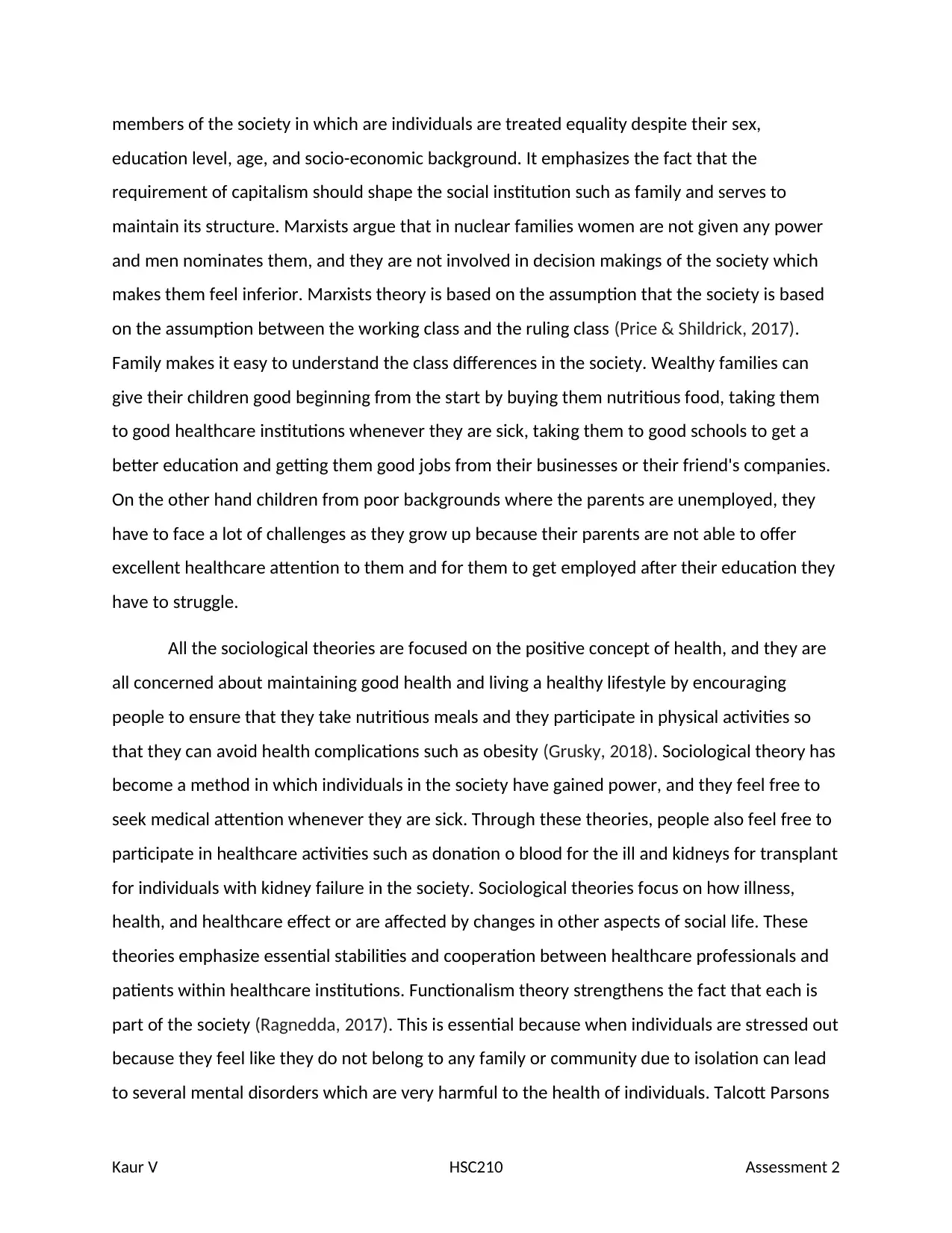
members of the society in which are individuals are treated equality despite their sex,
education level, age, and socio-economic background. It emphasizes the fact that the
requirement of capitalism should shape the social institution such as family and serves to
maintain its structure. Marxists argue that in nuclear families women are not given any power
and men nominates them, and they are not involved in decision makings of the society which
makes them feel inferior. Marxists theory is based on the assumption that the society is based
on the assumption between the working class and the ruling class (Price & Shildrick, 2017).
Family makes it easy to understand the class differences in the society. Wealthy families can
give their children good beginning from the start by buying them nutritious food, taking them
to good healthcare institutions whenever they are sick, taking them to good schools to get a
better education and getting them good jobs from their businesses or their friend's companies.
On the other hand children from poor backgrounds where the parents are unemployed, they
have to face a lot of challenges as they grow up because their parents are not able to offer
excellent healthcare attention to them and for them to get employed after their education they
have to struggle.
All the sociological theories are focused on the positive concept of health, and they are
all concerned about maintaining good health and living a healthy lifestyle by encouraging
people to ensure that they take nutritious meals and they participate in physical activities so
that they can avoid health complications such as obesity (Grusky, 2018). Sociological theory has
become a method in which individuals in the society have gained power, and they feel free to
seek medical attention whenever they are sick. Through these theories, people also feel free to
participate in healthcare activities such as donation o blood for the ill and kidneys for transplant
for individuals with kidney failure in the society. Sociological theories focus on how illness,
health, and healthcare effect or are affected by changes in other aspects of social life. These
theories emphasize essential stabilities and cooperation between healthcare professionals and
patients within healthcare institutions. Functionalism theory strengthens the fact that each is
part of the society (Ragnedda, 2017). This is essential because when individuals are stressed out
because they feel like they do not belong to any family or community due to isolation can lead
to several mental disorders which are very harmful to the health of individuals. Talcott Parsons
Kaur V HSC210 Assessment 2
education level, age, and socio-economic background. It emphasizes the fact that the
requirement of capitalism should shape the social institution such as family and serves to
maintain its structure. Marxists argue that in nuclear families women are not given any power
and men nominates them, and they are not involved in decision makings of the society which
makes them feel inferior. Marxists theory is based on the assumption that the society is based
on the assumption between the working class and the ruling class (Price & Shildrick, 2017).
Family makes it easy to understand the class differences in the society. Wealthy families can
give their children good beginning from the start by buying them nutritious food, taking them
to good healthcare institutions whenever they are sick, taking them to good schools to get a
better education and getting them good jobs from their businesses or their friend's companies.
On the other hand children from poor backgrounds where the parents are unemployed, they
have to face a lot of challenges as they grow up because their parents are not able to offer
excellent healthcare attention to them and for them to get employed after their education they
have to struggle.
All the sociological theories are focused on the positive concept of health, and they are
all concerned about maintaining good health and living a healthy lifestyle by encouraging
people to ensure that they take nutritious meals and they participate in physical activities so
that they can avoid health complications such as obesity (Grusky, 2018). Sociological theory has
become a method in which individuals in the society have gained power, and they feel free to
seek medical attention whenever they are sick. Through these theories, people also feel free to
participate in healthcare activities such as donation o blood for the ill and kidneys for transplant
for individuals with kidney failure in the society. Sociological theories focus on how illness,
health, and healthcare effect or are affected by changes in other aspects of social life. These
theories emphasize essential stabilities and cooperation between healthcare professionals and
patients within healthcare institutions. Functionalism theory strengthens the fact that each is
part of the society (Ragnedda, 2017). This is essential because when individuals are stressed out
because they feel like they do not belong to any family or community due to isolation can lead
to several mental disorders which are very harmful to the health of individuals. Talcott Parsons
Kaur V HSC210 Assessment 2
Paraphrase This Document
Need a fresh take? Get an instant paraphrase of this document with our AI Paraphraser
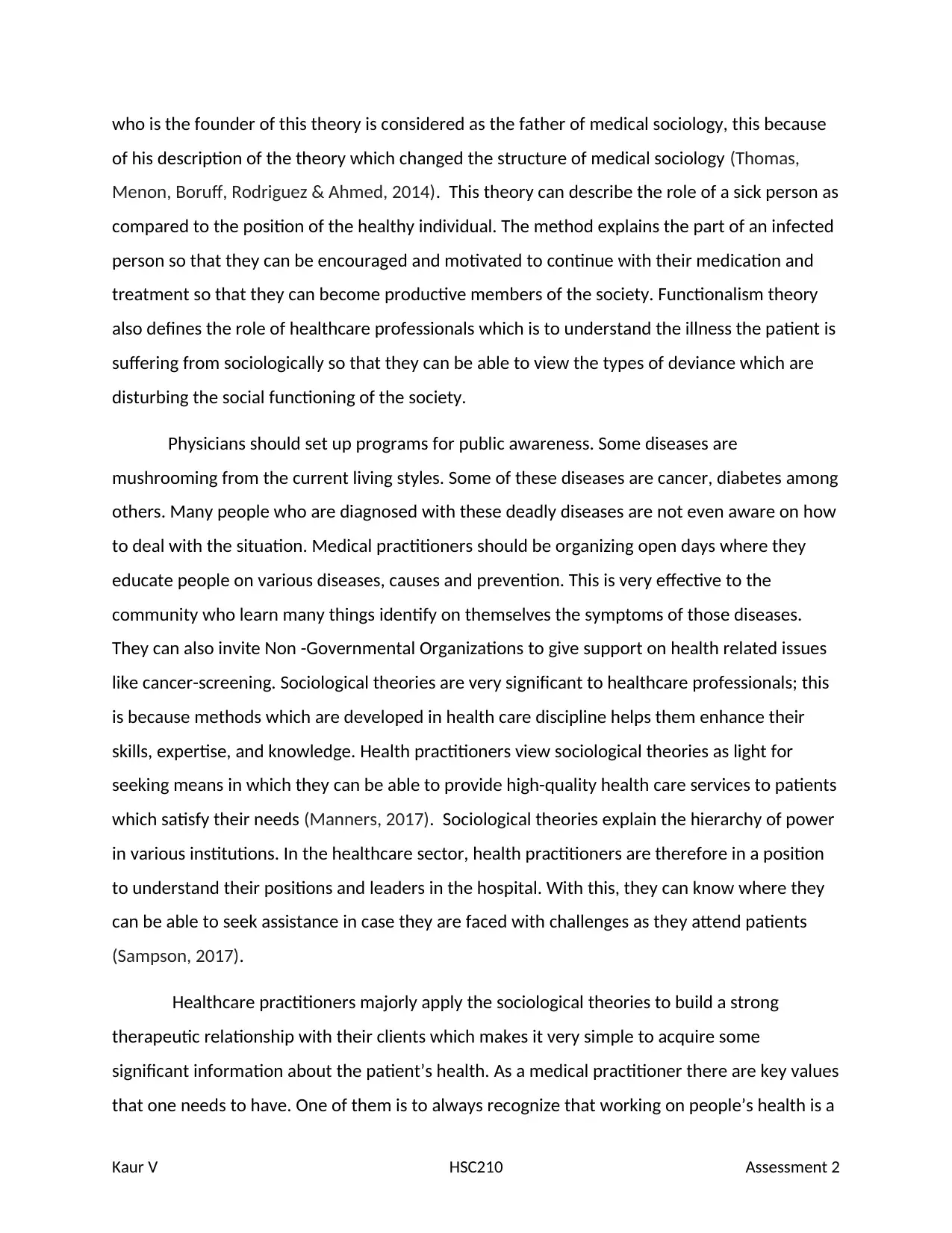
who is the founder of this theory is considered as the father of medical sociology, this because
of his description of the theory which changed the structure of medical sociology (Thomas,
Menon, Boruff, Rodriguez & Ahmed, 2014). This theory can describe the role of a sick person as
compared to the position of the healthy individual. The method explains the part of an infected
person so that they can be encouraged and motivated to continue with their medication and
treatment so that they can become productive members of the society. Functionalism theory
also defines the role of healthcare professionals which is to understand the illness the patient is
suffering from sociologically so that they can be able to view the types of deviance which are
disturbing the social functioning of the society.
Physicians should set up programs for public awareness. Some diseases are
mushrooming from the current living styles. Some of these diseases are cancer, diabetes among
others. Many people who are diagnosed with these deadly diseases are not even aware on how
to deal with the situation. Medical practitioners should be organizing open days where they
educate people on various diseases, causes and prevention. This is very effective to the
community who learn many things identify on themselves the symptoms of those diseases.
They can also invite Non -Governmental Organizations to give support on health related issues
like cancer-screening. Sociological theories are very significant to healthcare professionals; this
is because methods which are developed in health care discipline helps them enhance their
skills, expertise, and knowledge. Health practitioners view sociological theories as light for
seeking means in which they can be able to provide high-quality health care services to patients
which satisfy their needs (Manners, 2017). Sociological theories explain the hierarchy of power
in various institutions. In the healthcare sector, health practitioners are therefore in a position
to understand their positions and leaders in the hospital. With this, they can know where they
can be able to seek assistance in case they are faced with challenges as they attend patients
(Sampson, 2017).
Healthcare practitioners majorly apply the sociological theories to build a strong
therapeutic relationship with their clients which makes it very simple to acquire some
significant information about the patient’s health. As a medical practitioner there are key values
that one needs to have. One of them is to always recognize that working on people’s health is a
Kaur V HSC210 Assessment 2
of his description of the theory which changed the structure of medical sociology (Thomas,
Menon, Boruff, Rodriguez & Ahmed, 2014). This theory can describe the role of a sick person as
compared to the position of the healthy individual. The method explains the part of an infected
person so that they can be encouraged and motivated to continue with their medication and
treatment so that they can become productive members of the society. Functionalism theory
also defines the role of healthcare professionals which is to understand the illness the patient is
suffering from sociologically so that they can be able to view the types of deviance which are
disturbing the social functioning of the society.
Physicians should set up programs for public awareness. Some diseases are
mushrooming from the current living styles. Some of these diseases are cancer, diabetes among
others. Many people who are diagnosed with these deadly diseases are not even aware on how
to deal with the situation. Medical practitioners should be organizing open days where they
educate people on various diseases, causes and prevention. This is very effective to the
community who learn many things identify on themselves the symptoms of those diseases.
They can also invite Non -Governmental Organizations to give support on health related issues
like cancer-screening. Sociological theories are very significant to healthcare professionals; this
is because methods which are developed in health care discipline helps them enhance their
skills, expertise, and knowledge. Health practitioners view sociological theories as light for
seeking means in which they can be able to provide high-quality health care services to patients
which satisfy their needs (Manners, 2017). Sociological theories explain the hierarchy of power
in various institutions. In the healthcare sector, health practitioners are therefore in a position
to understand their positions and leaders in the hospital. With this, they can know where they
can be able to seek assistance in case they are faced with challenges as they attend patients
(Sampson, 2017).
Healthcare practitioners majorly apply the sociological theories to build a strong
therapeutic relationship with their clients which makes it very simple to acquire some
significant information about the patient’s health. As a medical practitioner there are key values
that one needs to have. One of them is to always recognize that working on people’s health is a
Kaur V HSC210 Assessment 2
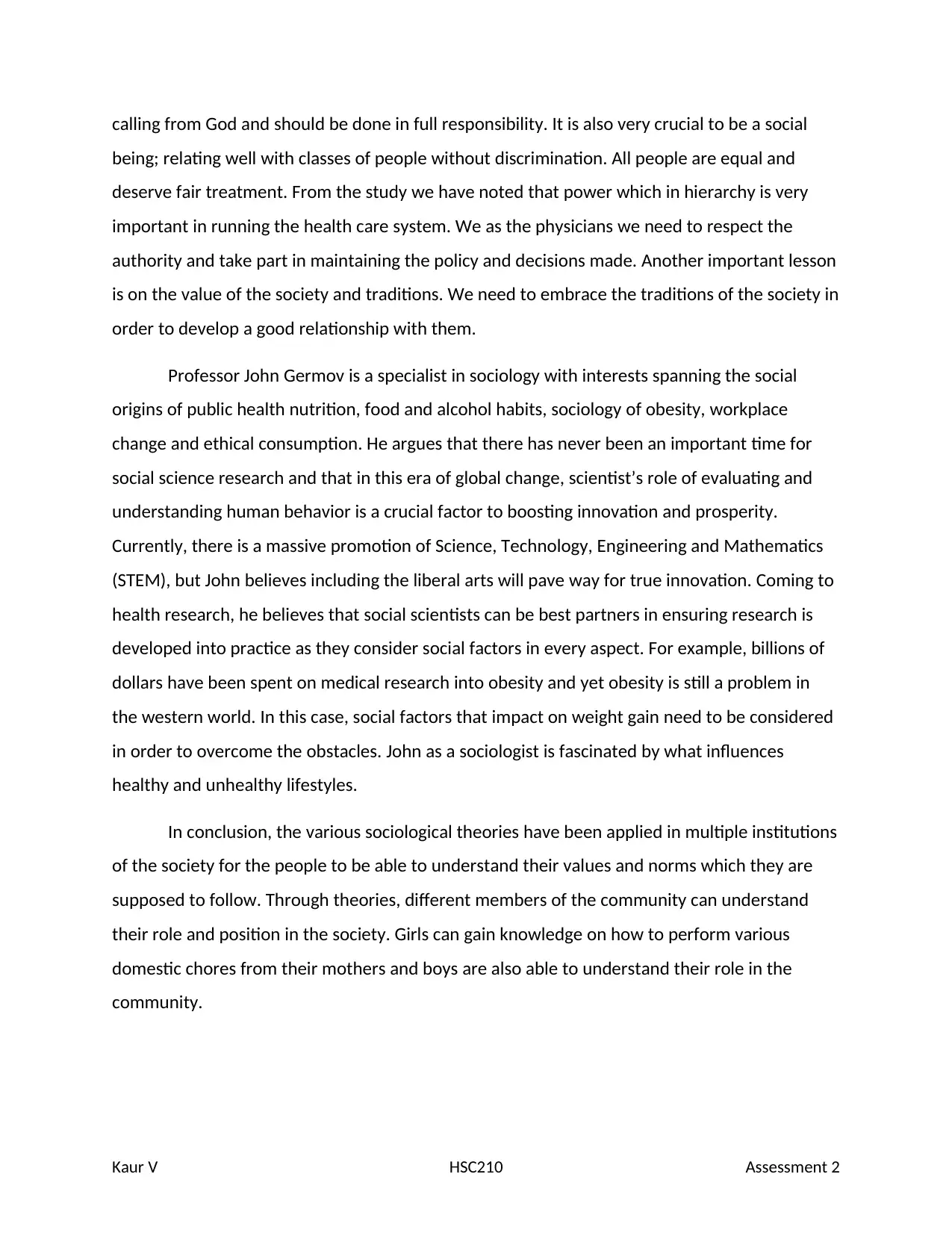
calling from God and should be done in full responsibility. It is also very crucial to be a social
being; relating well with classes of people without discrimination. All people are equal and
deserve fair treatment. From the study we have noted that power which in hierarchy is very
important in running the health care system. We as the physicians we need to respect the
authority and take part in maintaining the policy and decisions made. Another important lesson
is on the value of the society and traditions. We need to embrace the traditions of the society in
order to develop a good relationship with them.
Professor John Germov is a specialist in sociology with interests spanning the social
origins of public health nutrition, food and alcohol habits, sociology of obesity, workplace
change and ethical consumption. He argues that there has never been an important time for
social science research and that in this era of global change, scientist’s role of evaluating and
understanding human behavior is a crucial factor to boosting innovation and prosperity.
Currently, there is a massive promotion of Science, Technology, Engineering and Mathematics
(STEM), but John believes including the liberal arts will pave way for true innovation. Coming to
health research, he believes that social scientists can be best partners in ensuring research is
developed into practice as they consider social factors in every aspect. For example, billions of
dollars have been spent on medical research into obesity and yet obesity is still a problem in
the western world. In this case, social factors that impact on weight gain need to be considered
in order to overcome the obstacles. John as a sociologist is fascinated by what influences
healthy and unhealthy lifestyles.
In conclusion, the various sociological theories have been applied in multiple institutions
of the society for the people to be able to understand their values and norms which they are
supposed to follow. Through theories, different members of the community can understand
their role and position in the society. Girls can gain knowledge on how to perform various
domestic chores from their mothers and boys are also able to understand their role in the
community.
Kaur V HSC210 Assessment 2
being; relating well with classes of people without discrimination. All people are equal and
deserve fair treatment. From the study we have noted that power which in hierarchy is very
important in running the health care system. We as the physicians we need to respect the
authority and take part in maintaining the policy and decisions made. Another important lesson
is on the value of the society and traditions. We need to embrace the traditions of the society in
order to develop a good relationship with them.
Professor John Germov is a specialist in sociology with interests spanning the social
origins of public health nutrition, food and alcohol habits, sociology of obesity, workplace
change and ethical consumption. He argues that there has never been an important time for
social science research and that in this era of global change, scientist’s role of evaluating and
understanding human behavior is a crucial factor to boosting innovation and prosperity.
Currently, there is a massive promotion of Science, Technology, Engineering and Mathematics
(STEM), but John believes including the liberal arts will pave way for true innovation. Coming to
health research, he believes that social scientists can be best partners in ensuring research is
developed into practice as they consider social factors in every aspect. For example, billions of
dollars have been spent on medical research into obesity and yet obesity is still a problem in
the western world. In this case, social factors that impact on weight gain need to be considered
in order to overcome the obstacles. John as a sociologist is fascinated by what influences
healthy and unhealthy lifestyles.
In conclusion, the various sociological theories have been applied in multiple institutions
of the society for the people to be able to understand their values and norms which they are
supposed to follow. Through theories, different members of the community can understand
their role and position in the society. Girls can gain knowledge on how to perform various
domestic chores from their mothers and boys are also able to understand their role in the
community.
Kaur V HSC210 Assessment 2
⊘ This is a preview!⊘
Do you want full access?
Subscribe today to unlock all pages.

Trusted by 1+ million students worldwide
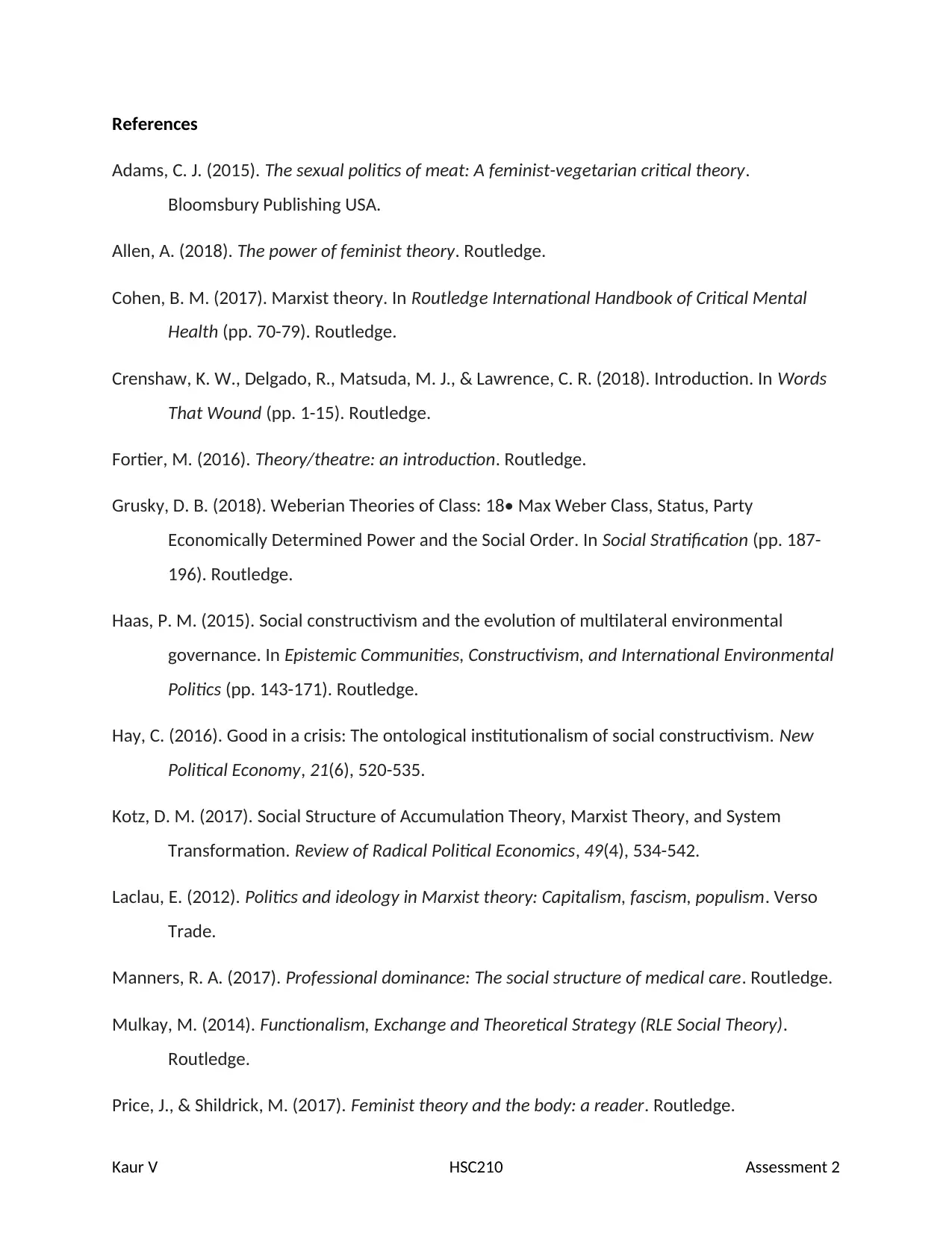
References
Adams, C. J. (2015). The sexual politics of meat: A feminist-vegetarian critical theory.
Bloomsbury Publishing USA.
Allen, A. (2018). The power of feminist theory. Routledge.
Cohen, B. M. (2017). Marxist theory. In Routledge International Handbook of Critical Mental
Health (pp. 70-79). Routledge.
Crenshaw, K. W., Delgado, R., Matsuda, M. J., & Lawrence, C. R. (2018). Introduction. In Words
That Wound (pp. 1-15). Routledge.
Fortier, M. (2016). Theory/theatre: an introduction. Routledge.
Grusky, D. B. (2018). Weberian Theories of Class: 18• Max Weber Class, Status, Party
Economically Determined Power and the Social Order. In Social Stratification (pp. 187-
196). Routledge.
Haas, P. M. (2015). Social constructivism and the evolution of multilateral environmental
governance. In Epistemic Communities, Constructivism, and International Environmental
Politics (pp. 143-171). Routledge.
Hay, C. (2016). Good in a crisis: The ontological institutionalism of social constructivism. New
Political Economy, 21(6), 520-535.
Kotz, D. M. (2017). Social Structure of Accumulation Theory, Marxist Theory, and System
Transformation. Review of Radical Political Economics, 49(4), 534-542.
Laclau, E. (2012). Politics and ideology in Marxist theory: Capitalism, fascism, populism. Verso
Trade.
Manners, R. A. (2017). Professional dominance: The social structure of medical care. Routledge.
Mulkay, M. (2014). Functionalism, Exchange and Theoretical Strategy (RLE Social Theory).
Routledge.
Price, J., & Shildrick, M. (2017). Feminist theory and the body: a reader. Routledge.
Kaur V HSC210 Assessment 2
Adams, C. J. (2015). The sexual politics of meat: A feminist-vegetarian critical theory.
Bloomsbury Publishing USA.
Allen, A. (2018). The power of feminist theory. Routledge.
Cohen, B. M. (2017). Marxist theory. In Routledge International Handbook of Critical Mental
Health (pp. 70-79). Routledge.
Crenshaw, K. W., Delgado, R., Matsuda, M. J., & Lawrence, C. R. (2018). Introduction. In Words
That Wound (pp. 1-15). Routledge.
Fortier, M. (2016). Theory/theatre: an introduction. Routledge.
Grusky, D. B. (2018). Weberian Theories of Class: 18• Max Weber Class, Status, Party
Economically Determined Power and the Social Order. In Social Stratification (pp. 187-
196). Routledge.
Haas, P. M. (2015). Social constructivism and the evolution of multilateral environmental
governance. In Epistemic Communities, Constructivism, and International Environmental
Politics (pp. 143-171). Routledge.
Hay, C. (2016). Good in a crisis: The ontological institutionalism of social constructivism. New
Political Economy, 21(6), 520-535.
Kotz, D. M. (2017). Social Structure of Accumulation Theory, Marxist Theory, and System
Transformation. Review of Radical Political Economics, 49(4), 534-542.
Laclau, E. (2012). Politics and ideology in Marxist theory: Capitalism, fascism, populism. Verso
Trade.
Manners, R. A. (2017). Professional dominance: The social structure of medical care. Routledge.
Mulkay, M. (2014). Functionalism, Exchange and Theoretical Strategy (RLE Social Theory).
Routledge.
Price, J., & Shildrick, M. (2017). Feminist theory and the body: a reader. Routledge.
Kaur V HSC210 Assessment 2
Paraphrase This Document
Need a fresh take? Get an instant paraphrase of this document with our AI Paraphraser
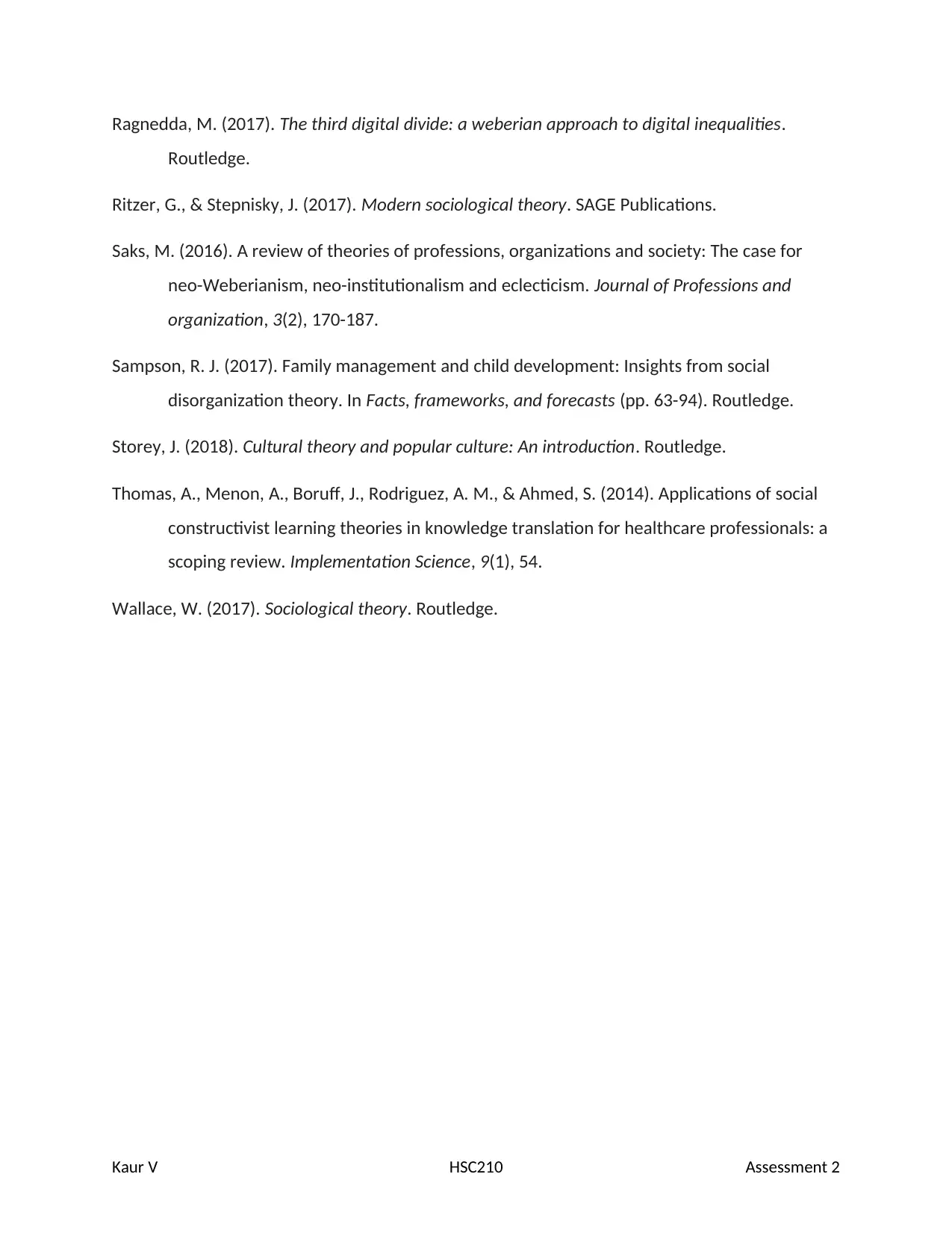
Ragnedda, M. (2017). The third digital divide: a weberian approach to digital inequalities.
Routledge.
Ritzer, G., & Stepnisky, J. (2017). Modern sociological theory. SAGE Publications.
Saks, M. (2016). A review of theories of professions, organizations and society: The case for
neo-Weberianism, neo-institutionalism and eclecticism. Journal of Professions and
organization, 3(2), 170-187.
Sampson, R. J. (2017). Family management and child development: Insights from social
disorganization theory. In Facts, frameworks, and forecasts (pp. 63-94). Routledge.
Storey, J. (2018). Cultural theory and popular culture: An introduction. Routledge.
Thomas, A., Menon, A., Boruff, J., Rodriguez, A. M., & Ahmed, S. (2014). Applications of social
constructivist learning theories in knowledge translation for healthcare professionals: a
scoping review. Implementation Science, 9(1), 54.
Wallace, W. (2017). Sociological theory. Routledge.
Kaur V HSC210 Assessment 2
Routledge.
Ritzer, G., & Stepnisky, J. (2017). Modern sociological theory. SAGE Publications.
Saks, M. (2016). A review of theories of professions, organizations and society: The case for
neo-Weberianism, neo-institutionalism and eclecticism. Journal of Professions and
organization, 3(2), 170-187.
Sampson, R. J. (2017). Family management and child development: Insights from social
disorganization theory. In Facts, frameworks, and forecasts (pp. 63-94). Routledge.
Storey, J. (2018). Cultural theory and popular culture: An introduction. Routledge.
Thomas, A., Menon, A., Boruff, J., Rodriguez, A. M., & Ahmed, S. (2014). Applications of social
constructivist learning theories in knowledge translation for healthcare professionals: a
scoping review. Implementation Science, 9(1), 54.
Wallace, W. (2017). Sociological theory. Routledge.
Kaur V HSC210 Assessment 2
1 out of 8
Related Documents
Your All-in-One AI-Powered Toolkit for Academic Success.
+13062052269
info@desklib.com
Available 24*7 on WhatsApp / Email
![[object Object]](/_next/static/media/star-bottom.7253800d.svg)
Unlock your academic potential
Copyright © 2020–2026 A2Z Services. All Rights Reserved. Developed and managed by ZUCOL.




